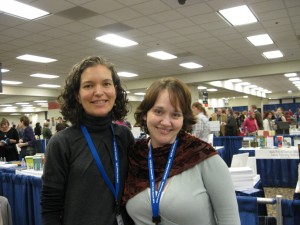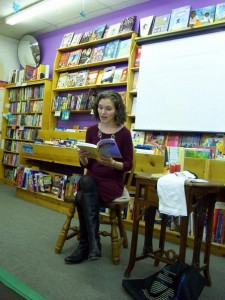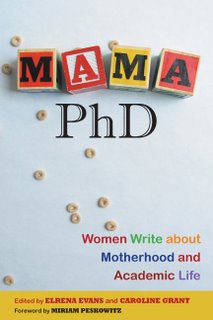Literary Mama Review
March 4th, 2009Esther Wyss-Flamm has reviewed Mama, PhD for Literary Mama; here’s an excerpt:
My first reaction to Mama, PhD, a provocative collection of 35 personal essays and commentaries by 42 women about motherhood and academic life, was a powerful desire to do just what I’ve begun to do here: tell my own story. Edited by Elrena Evans and Caroline Grant, the book features deeply personal and engaging essays that bring to life many facets of this topic: the internal fracturing that comes with considering whether or not to have a child, vivid descriptions of the body’s blossoming during pregnancy, poignant accounts of how it feels to be sidelined by insensitive comments, the heartbreak of leaving one’s child in someone else’s care, the infamous fog of Mommy Brain. In addition, much of the writing is peppered with winsome humor, including laugh-out-loud descriptions of wedging a pregnant body into a desk-chair combination of the type that graces most university classrooms (Evans) or of fielding potential names for a baby from mostly male undergraduates (Sheila Squillante).
Please click on over to Literary Mama to read the rest!
Mama, PhD in Mamazine!
March 2nd, 2009We’re sad to hear that after several years of publishing great writing (including this piece of Elrena‘s), Mamazine is shutting down to focus on other projects. We’re pleased that before stopping publication they had time to read Mama, PhD ; here’s an excerpt from Amy Anderson’s review:
Fortunately, while Mama, PhD
has many stories like mine, reading about others’ experiences made me feel (well, duh!) less alone. It also made me remember a few things. For one, I’ve been lucky enough to have department chairs who wholeheartedly support working parents with their words (“Bring that baby in!”) and their actions (“Sure, we can pay for a sub to cover your classes those weeks you’ll be recovering from a c-section.”) Many of the women whose essays are in this book don’t have that kind of support, and the consequences are often dramatic.
Click on over to Mamazine to read the rest!
Call for Submissions: Dads in Academia
February 23rd, 2009The editors of Dads in Academia: Male Voices In and Out of the Ivory Tower invite contributions for an interdisciplinary collection of creative nonfiction essays on the rewards and challenges of being both a father and an academic. Much recent discussion about the juxtaposition of parenthood and the academy has focused on the difficulties that female professors face when they choose to become mothers. Books like Mama, PhD, edited by Caroline Grant and Elrena Evans, depict the oftentimes bleak prospects of merging the two endeavors. This collection welcomes the masculine voice into this lively and provocative dialogue. Further, Dads in Academia creates a space for male professors to describe their own experiences of balancing the demands and desires of two worlds that have changed notably throughout the past few decades: fatherhood and academia.
We encourage contributors to consider the changing cultural perceptions, representations, and expectations associated with fatherhood, and to explore the impact of such changes on their identities as teachers and scholars. Increasingly, fathers are taking on a more intense role with regard to child-rearing than ever before. How do today’s male academics view their participation in the parenting process? How is this changing the nature of the job? Has the evolving role of the father in contemporary society changed the job itself?
We also welcome essays that focus on how the evolution of fatherhood is changing the face of academia. Have we seen any concrete changes on college campuses to encourage the “professor as interactive father” schemata? What is the climate like for male professors who “want it all”? Are they able to balance fatherhood and the road to tenure? What gives?
Editors:
Mary Ruth Marotte, Ph.D. is an Assistant Professor of English and the Director of Graduate Studies in English at the University of Central Arkansas, where she specializes in women’s studies and critical theory. Her book, Captive Bodies: American Women Writers Redefine Pregnancy and Childbirth, was released by Demeter Press in October 2008. She lives in Conway, AR with her husband and three children.
Paige Martin Reynolds, Ph.D. is an Assistant Professor of English at the University of Central Arkansas. Her specializations include Shakespeare, British Renaissance Drama, Performance Studies, and Elizabeth I. She has written articles published or forthcoming in SEL: Studies in English Literature, 1500-1900, ANQ: American Notes and Queries, and 1650-1850: Ideas, Aesthetics, and Inquiries in the Early Modern Era. She lives in Little Rock, AR with her husband and daughter.
Length: 1,500 to 4,000 words.
Format: Essays must be typed, double-spaced, and paginated. Please include your name, address, phone number, e-mail address, and a short bio on the last page.
Contact: Mary Ruth Marotte at mrmarotte AT hotmail DOT com for more information
The MotherVerse Interview
February 23rd, 2009Writer Kris Underwood recently interviewed Elrena and Caroline for MotherVerse; here’s an excerpt from the interview:
MV: In culling through the essays, was there any one in particular that affected you personally?
Caroline: When people ask me how we chose the essays, I always say that we chose the essays that made us cry, and the ones that made us laugh. And I have read these essays many, many times now, and they still touch me the way they did when I first put each one in the “Yes” pile. Leah Bradshaw writes about falling asleep nursing her daughter, and waking to find that a window has blown open and they are dusted with snow— it’s an image of the universal absorption and exhaustion of new motherhood that has stayed with me. I quote the title of Libby Gruner’s essay, “I Am Not A Head On A Stick,” all the time, since it sums up so succinctly the prevailing attitude women are challenging in academia. And I love the affirmations in the essay “Momifesto;” there are two in particular that thrum through my head, depending on my mood: “You are maternally beautiful” and “You can promote motherhood professionally, and it is a political statement.”
Elrena: I read through the bulk of our submissions in the first few days after my son was born, (don’t ask me why, it seemed like a good idea at the time!) so I was pretty affected by anyone writing about having a baby, or nursing, or anything else I could even remotely apply to my situation. What I found, though, was that I saw bits and pieces in each essay we ultimately chose that spoke directly to me. Now, these essays have embedded themselves so deeply in my brain that I often find myself thinking of passages—kind of like the way that song lyrics off of a really good album stick in your mind. Rosemarie Emanuele writes about other mothers helping her to see that her child was not a “behavioral outlier,” I think of that phrase when my children have tantrums; Anjalee Deshpande Nadkarni writes of her life that “every day is a risk and a possibility,” I think that’s a great quote first thing in the morning!
Click on over to MotherVerse to read the rest!
The Politics of Reproduction: New Technologies of Life
February 19th, 2009Barnard Center for Research on Women is hosting a conference February 28 entitled “The Politics of Reproduction: New Technologies of Life,” which will take up many of the questions that surround the increasing use of assisted reproductive technologies and adoption to build families. Propelled by changes in familial form, such as lesbian, gay, and transgendered parents and families; delays in childbearing; and childrearing in second or third marriages, the use of ART and transnational adoption is growing, and so are the questions that accompany the use of these new ways of creating families. For instance, do these new technologies place women and children at risk? How should we respond ethically to the ability of these technologies to test for genetic illnesses? How can we ensure that marginalized individuals, for example, people with disabilities, women of color, and low-income women, have equal access to these new technologies and adoption practices? And, similarly, how do we ensure that transnational surrogacy and adoption practices are not exploitative?
For more information about the conference, including a full list of participants, please visit the website.
Mama, PhD in Chicago
February 19th, 2009It was wonderful to attend the Association of Writers & Writing Programs Conference in Chicago recently and meet some more fans of and contributors to Mama, PhD. Here are some pictures:
Mothers on the Tenure Track
February 4th, 2009Last fall, Elrena and Caroline had the opportunity to talk with Andrea O’Reilly (director of the Association for Research on Mothering) in a conversation for The Mothers Movement Online, moderated by Professor Heather Hewett, Coordinator of Women’s Studies and an Assistant Professor in the Department of English at SUNY New Paltz. Here’s a brief excerpt:
Heather Hewett: I’m struck by the fact that all of you agree that we need to change attitudes as well as policy — and I wonder if that’s why you all chose to collect stories, albeit in different ways. Is there something about personal stories that are particularly powerful for the situation facing moms in academia?
Caroline Grant: Yes, yes, yes. I think personal stories draw you in and make them relate on a level that a numbers report just can’t achieve. Elrena and I were challenged a bit on that point, early in our work on the book, and we felt strongly about making the book conversational, not confrontational.
Elrena Evans: I think it’s kind of like the research that’s been done on birthing narratives — why do women feel compelled to tell their birth stories again and again, sometimes to people they barely know — there’s strength in sharing these stories, in knowing that you’re not, as one of our contributors put it, a statistical outlier.
I like to think of personal essays and more quantitative research as parts of the same whole. Research can give us numbers, data, percentages, “facts” if you will, but the personal essay can provide the story behind the data. I know that for me, personally, it’s one thing to read that X number of women delay children until after tenure, for example; but it gives me a completely different perspective to read about what that was like for a specific woman, the longing, the waiting, the eventual fulfillment of her “heart’s desire,” as one of our contributors writes. And then I can take that story, and begin to imagine all the others behind the numbers, and it really makes me look at the research differently.
Andrea O’Reilly: That leads to another theme. I found Joan Williams’ concept of the wall in academe a fitting metaphor. Today I think that women, if they act enough like one of the boys, can make it academe… but once they become moms, they hit full-throttle that academic wall that completely blindsides them. So my work is looking at how moms are getting through and around that wall. And for many it is the detour route — i.e., taking an academic post that is more compatible with motherhood (not at a research university).
Click on over to The Mothers Movement Online to read the rest!
Good News for Working Women
January 29th, 2009I’m thrilled that President Obama has signed the Lilly Ledbetter Fair Pay Act today, a big step toward assuring women equal pay for equal work:
“Goodyear will never have to pay me what it cheated me out of. In fact, I will never see a cent from my case,” Ledbetter said. “But with the … president’s signature today, I will have an even richer reward. I know that my daughters and granddaughters and your daughters and your granddaughters will have a better deal.”
CFP: Mothers Creating/Writing Lives: Motherhood Memoirs
January 28th, 2009UPDATE: EXTENDED DEADLINE APRIL 15, 2009
Mothers Creating/Writing Lives: Motherhood Memoirs
As memoir continues to expand in popularity, motherhood memoir has become an increasingly prominent and lucrative subgenre for contemporary authors. As Michelle Herman points out in The Middle of Everything: Memoirs of Motherhood, if forced to choose between her daughter and her writing, she would choose her daughter, but this would be a gut-wrenching decision. Instead, her writing life is woven into her mothering life, and she finds that she can write in conditions she would have previously thought impossible. It is clear that writers who are also mothers must write their stories. How do they do it, why are so many readers interested in what they have to say, and what can we learn from them? Women have been writing about motherhood as long as they have been writing, but the contemporary shift to tell-all memoirs has changed the rules of writing about mothering, and perhaps, of mothering itself.
We are seeking proposals for a collection that will interrogate and critique the motherhood memoir. In addition to a new collection entitled Mama Ph.D.: Women Write about Motherhood and Academic Life, there are several very recent motherhood memoirs that demand critical attention, works such as: Adrienne Martini’s, Hillbilly Gothic: A Memoir of Madness and Motherhood; Susan Johnson’s, A Better Woman; Ayun Halliday’s, The Big Rumpus; and Anne Roiphe’s, Living Contradictions: A Memoir of Modern Motherhood. What are these and other writing mothers saying about the experience of mothering today? What, if any, universals are present in motherhood memoirs? What societal critiques and suggestions provide the bedrock for potential revolutionary parenting practices? This collection will strive to bridge the distance between writing mothers who are critics and writing mothers who are authors by privileging academic work that seeks to discuss and contextualize motherhood memoirs beside authors’ own experiences of mothering, academic life, and writing. Autotheoretical works are encouraged, as are works that seek to meaningfully compare contemporary motherhood memoirs with those written in other eras, or works which thematically explore a grouping of memoirs. For example, one might discuss the role of fathers, special needs children, mothering and mental illness, etc. in several volumes, particularly if these topics inform the author’s own experiences. Other possible topics include the range of issues related to choice (the choice of whether/when/how to mother, etc.), mothering and socioeconomic class, mothering and race, mothering at different ages, mothering and prose/poetic form, mothering and sexuality, and other topical themes.
Please send one to two page proposals and a curriculum vitae to Justine Dymond, jdymond AT spfldcol DOT edu , and Nicole Willey, nwilley AT kent DOT edu, by April 15, 2009.
Can Work in Higher Education Be Family Friendly?
January 15th, 2009Doctoral students at the University of California campuses think not, according to a survey released this week by Mary Ann Mason, former dean of the UC Berkeley graduate division and co-author of Mothers on the Fast Track; Marc Goulden, a researcher at the University of California; and Karie Frasch, manager of the UC Faculty Family Friendly Edge project.
“The survey [of more than 8300 graduate students] found that 84 percent of women and 74 percent of men are somewhat or very concerned about the family friendliness of their future employers. But only 46 percent of men and only 29 percent of women imagine jobs in research universities to be somewhat or very family friendly.”
Read more about the study at Inside Higher Ed.





 Join us on Facebook
Join us on Facebook